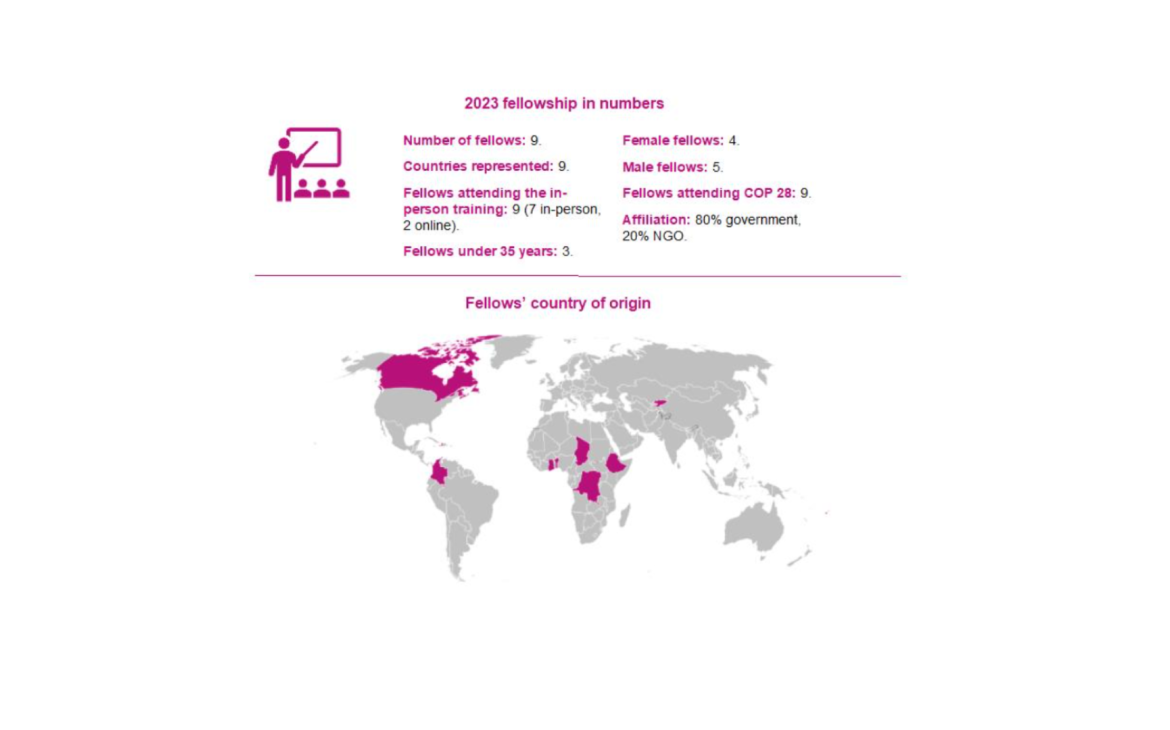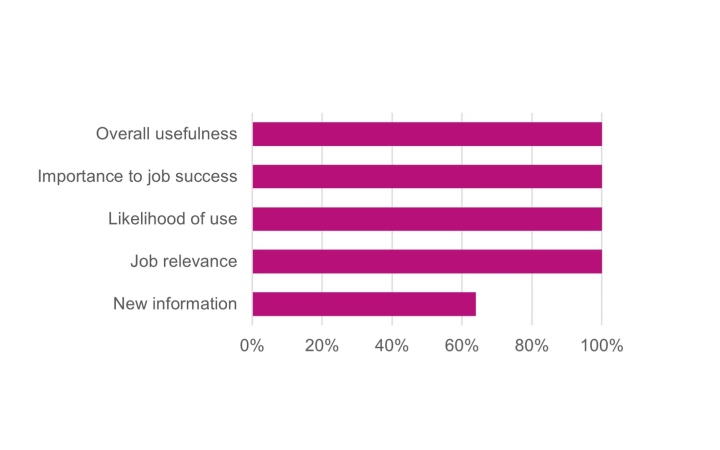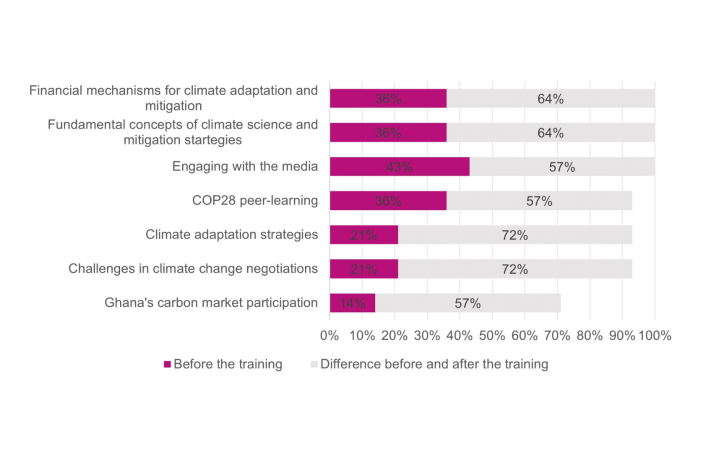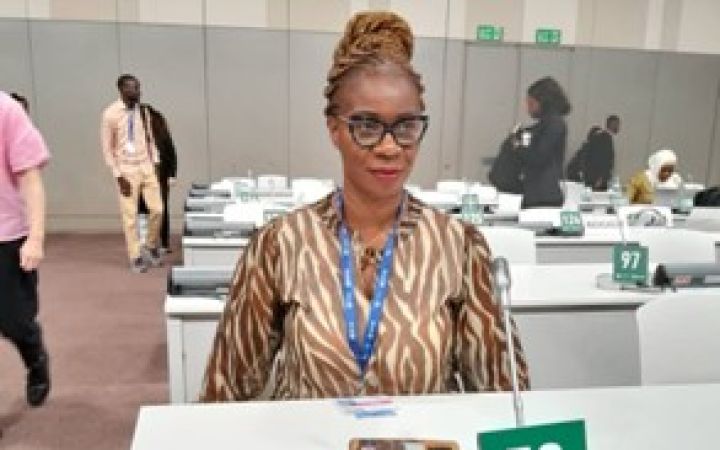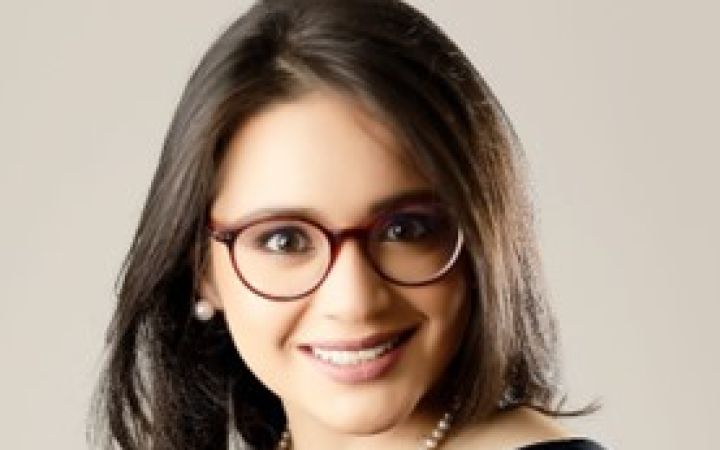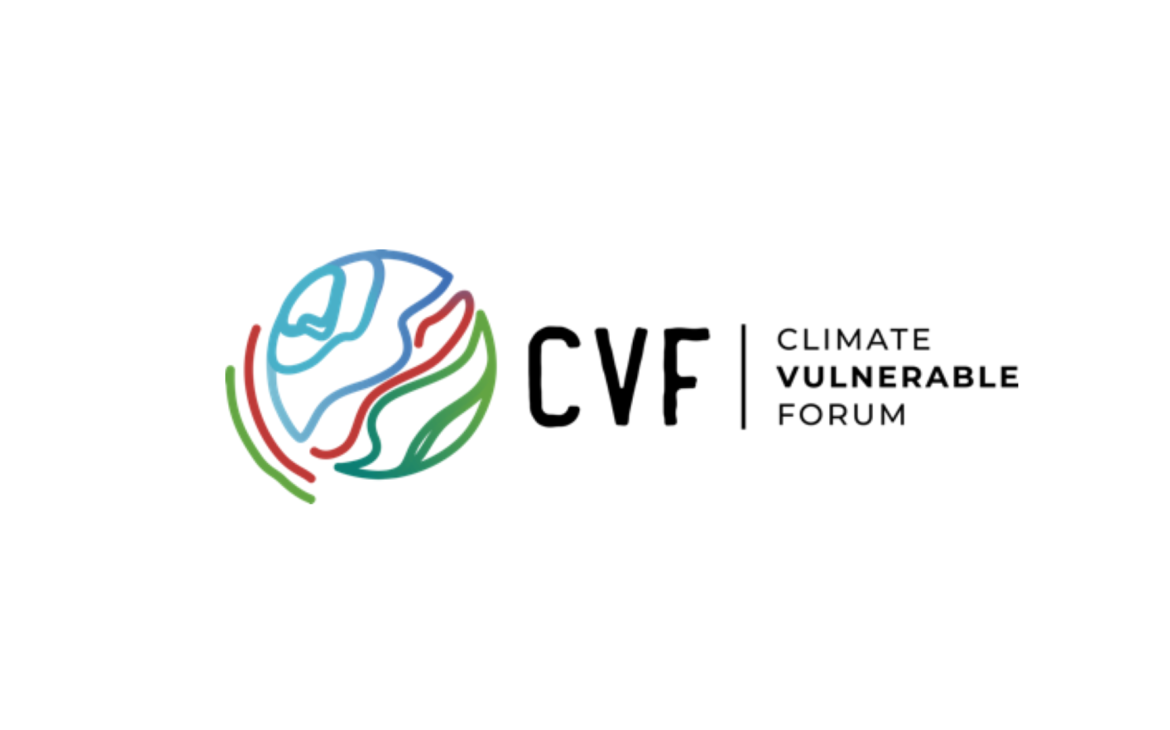Background
The United Nations Sustainable Development Goal (SDG) 13 calls to take urgent action to combat climate change and its impacts with strong emphasis on further implementation of the United Nations Framework Convention on Climate Change (UNFCCC). While climate change is a global phenomenon, some countries are more vulnerable to a warming planet. Given this, the Climate Vulnerable Forum (CVF) was created in 2009 as a South-South cooperation platform for collective action to address global climate change. In 2021, UNITAR partnered with the CVF to implement the CVF capacity-building fellowship.
The fellowship aims at strengthening the capacities of CVF member countries to be better positioned to raise awareness of the challenges and opportunities their countries face as a result of climate change and to advance the countries’ priorities within UN processes (UNFCCC and Conference of the Parties (COP) meetings). Nine fellows from CVF member countries were selected in 2023.
The 2023 fellowship was held from April 2023 to February 2024. It comprised two components. The first component consisted of an online course which was delivered in May 2023, as a preparation for the participation in the 58th Session of the UNFCCC Subsidiary Bodies in June 2023 (“SB58”). As part of the second component, training was delivered in person in Accra in October 2023 before the participation in the COP28 which fellows attended afterwards.
The in-person training covered the overarching topic of climate change diplomacy, focusing on climate science and mitigation, adaptation, financing mechanisms, loss and damages, and media engagement and youth advocacy in the climate change negotiation field. The nine selected fellows attended the face-to-face workshop (seven in-person and two online), in addition to officers from the Ministry of Foreign Affairs and Regional Integration of Ghana, receiving 17 participants in total.
This Impact Story documents how the 2023 fellows applied knowledge and skills gained from the training in Ghana. It builds upon two interviews with fellows, self-evaluation results from training participants, and fellows’ reports on their participation in the COP28.
Links with the SDGs
The programme was aligned with SDG 13 “Climate Action” by raising the capacity for effective climate change-related planning and management in climate-vulnerable countries.
Application of knowledge and skills
The one-week in-person training received 17 participants, including eight of the nine CVF fellows. A reaction and a learning survey were conducted at the end of the training, receiving 14 responses (82 per cent response rate). While for a high proportion of participants, the information presented during the training was not new, they all found the information to be relevant and useful to their job, as shown in Figure 1. Participants particularly highlighted the usefulness of the training in preparation for the COP28.
The most relevant topics for survey respondents were the conceptual framework on climate science and mitigation strategies and engagement with the media, which were also the two topics in which participants indicated higher achievement of learning objectives. Survey respondents also indicated that their awareness of the topics covered had increased (93 per cent) as it was their knowledge on these topics, especially for the learning objectives related to climate adaptation strategies and challenges of youth activists and Global South nations in climate change negotiations. This is illustrated in Figure 2.
The training was extremely useful, it allowed me to learn more in-depth about the topics. For instance, even when I am negotiating climate finance, the insight that Mary Jane provided, enabled me to have a better understanding of the topics I work with regularly. Thank you so much for such a complete training.
Moreover, all survey respondents indicated that they intend to use the knowledge and skills from the training. This is reflected in the application of knowledge and skills reported by the fellows. Upon completion of the training, the fellows reported having adopted new ideas, tactics and perspectives from other fellows and having identified new ideas for regional projects during their participation in regional events.
Furthermore, the nine fellows participated in the COP28 and were involved in negotiations of article 6 of the Paris Agreement and participation and organization of side events. One fellow was not able to attend the COP28 but provided support to the delegation that attended with preparations. The fellow provided inputs to technical briefs and the country's national statement as well as any other background information as needed. Similarly, two other fellows reported the transfer of knowledge from the training with their countries’ delegations in preparation for the COP28 and with new negotiators.
Knowledge and skills from the training were applied by the fellows during their participation in the COP28 in the following ways:
- Participants contributed to enabling the eligibility of projects registered by their country (Benin) in the carbon market mechanism;
- Some paragraphs of instruments adopted were revised as they placed constraints on developing countries in terms of sustainability of nature-based credits and non-market approaches;
- Proposals for terminology modification were submitted;
- Preliminary agreements for technical support for participants' countries' REDD+ programme;
- Effective participation in coordination meetings that emphasized the position of climate-vulnerable countries which allowed them to present their interests and priorities such as ambitious climate action, mobilizing climate finance, ambition to be rewarded, consistency of financial flows and reform of the international financial system;
- Co-facilitation of gender negotiations; and
- One of the fellows had the opportunity to explore strategic partnerships as an unintended result of their participation in COP28.
Despite the fellows’ efforts to better represent their countries and regions, they recognize the challenges of achieving common agreements at the global level given the divergent positions of Parties. This is a structural factor that cannot be affected by building capacities. Yet, they recognize the value added by the training and how it improved their performance during the COP28.
External factors to the project implementation are also difficult having more space for presentations of the fellows’ own country/regional experiences as part of the knowledge exchange sessions, allocating more time to sessions related to project conceptualization, including more young fellows, and continuing to ensuring more geographical balance of fellows.
Angela I. Ebeleke Yoka
Angela I. Ebeleke Yoka
Gender and Climate Change focal point at the UNFCCC, Ministry of Environment and Sustainable Development, Democratic Republic of the Congo
Stepping up as a co-facilitator at COP28 negotiations on gender
Manchester, United Kingdom. Angela, or Angèle as she is called in the Democratic Republic of the Congo (DRC), is a National Gender and Climate Change Focal Point (NGCCFP) at the UNFCCC for the DRC and works as a course guide for the night school for new negotiators organized by the Women’s Environment and Development Organization (WEDO). Initially, Angela was educated in the area of health (tracheostomy) and her journey related to climate change started at COP22 in 2016 in Marrakech, Morocco, where she met the DRC Delegation which led to her appointment as Gender and Climate Change focal point. According to Angela,
When a patient or the earth is sick, one must take action and that has become her ‘leitmotiv’.
Angela was one of the ten fellows selected to join the Climate Vulnerable Forum (CVF) fellowship in 2023. As part of the fellowship, she took part in a UNITAR-CVF-organized one-week Climate Diplomacy Training in Accra, Ghana and the subsequent COP28 in Dubai, UAE where she was able to apply knowledge and skills from the training.
Angela gained more confidence and felt well-prepared to attend COP28, thanks to the training. While Angela has already attended seven previous COPs, COP28 was special for Angela because she was appointed Co-facilitator and co-responsible for the daily report on gender to the Subsidiary Body for Scientific and Technological Advice (SBSTA), one of two permanent subsidiary bodies to the Convention established by the COP/CMP. This included daily meetings with the secretariat, constant consultation with the co-facilitator from Canada and reporting back to the SBI and SBSTA Chairs in the evening. Despite the very work-intense period and late evening shifts, the experience was rewarding for Angela and helped her overcome any lack of confidence that she felt previously due to her dyslexia. Her message to other people with dyslexia is encouraging: “You can make it!”
Her gained confidence was also demonstrated by the fact that Angela felt more comfortable speaking in front of a larger audience following the training and spoke as a panellist on “the assessment of loss and damage in the case of KALEHE natural disaster in South Kivu, DRC”. Angela also felt recomforted by the fact that she mastered all the acronyms and that these were fresh on her mind, thanks to the UNITAR-CVF training organized shortly before COP28.
Another skill gained from the training and her experience working previously in a hospital included the fact of being impartial. Unlike previous COPs where Angela was presenting her country’s position, COP28 required her to report neutrally back to the secretariat which was new for her. At COP28, she even practised a similar role to the trainer from the UNITAR-CVF training in Ghana, which she found particularly rewarding.
Angela further used skills from the training’s session on “Engaging with Media” to deliver an interview with the Institut de la Francophonie pour le développement durable, part of the Organization internationale de la francophonie (OIF) at COP28.
The sessions focusing on Ghana’s experience and the carbon market were particularly insightful to Angela.
Despite all her achievements, Angela remains very humble and has made it a mission to support other younger negotiators from DRC at COP28 and provided them with directions, and recommendations and tried to encourage them when they were facing challenges with the English language.
“Empathy” is Angela’s favourite word, and it illustrates well her life mission of protecting the earth and supporting others, including women. An activist in her heart, Angela also campaigns on a local level at her home in Manchester, where she engages with the diaspora and local communities. This includes lecturing fellow church members about all 17 Sustainable Development Goals (SDGs) over 17 consecutive Sundays at the church, raising awareness about gardening and planting, and using music to advocate for the SDGs, amongst others.
Sofía Vargas-Lozada
Sofía Vargas-Lozada
Climate Finance Negotiator Lead – Ministry of Foreign Affairs of Colombia
Broadened approach to climate finance negotiations
Bogotá, Colombia. Sofía is the climate finance lead negotiator for the Ministry of Foreign Affairs of Colombia and one of the three finance leads of the Independent Association of Latin America and the Caribbean (AILAC) negotiation group under the UNFCCC and the Paris Agreement. She defines herself as a young negotiator and has always been interested in finance for development topics, but she got to work directly with the Paris Agreement, climate change and the environment through her current role which started in 2022. Sofía was one of the ten fellows selected to join the UNITAR-CVF fellowship in 2023. Sofía considers that the UNITAR-CVF fellowship provided her with additional insights and confidence that reshaped her approach to climate change negotiation. Sofía's story exemplifies the value of training for addressing global challenges like climate change.
Sofía learned about the CVF Fellowship through the CVF newsletter. Despite her experience in finance for development, Sofía recognized the importance of broadening her understanding and having more exposure to broader climate topics discussed under the UNFCCC and the Paris Agreement, as she says, “to have the remainder piece of the story”. Motivated by her ambition to effectively represent her country and advocate for climate-vulnerable groups that are committed to climate action, Sofía decided to participate in the training.
During the programme, Sofía found herself immersed in a diverse group of participants from various regions and functions, enriching her understanding through shared experiences. These sessions provided a deeper understanding of carbon markets, additionality, mitigation and adaptation discussion, and strategic negotiation approaches; some of which she had previously covered with mentoring sessions by former negotiators from her country; but mainly how all the topics connect.
Sofía considers that some of the skills gained during the training, such as communication skills, helped her find new confidence that was important when entering a negotiation room. More specifically, Sofía has approached some functions in her current role with a broader perspective and enhanced communication skills. For example, Sofía's participation in forums with civil society allowed her to demonstrate her ability to translate negotiation language into accessible messages, bridging gaps between stakeholders. Moreover, in 2023 Sofía participated in the COP28 as a negotiator for the first time and she considers that the training allowed her to enter the room more confidently, besides that she was able to reconnect with some of the fellows. The exchange with other fellows from climate-vulnerable countries that share the same ambition with her was highly valued by Sofía, as it helped her refine some of the messages that her group wanted to transmit during the negotiations. Strengthening the voice of developing countries that are highly vulnerable to climate and are deeply committed to climate action.
Sofía values the significant impact of in-person training sessions, where she could fully engage with trainers and fellow participants. She also appreciated the structured approach and relevance of the content of the training programme. For future editions of the programme, she suggested engaging more (young) negotiators, providing concise one-pagers on training topics beforehand to facilitate better preparation and continue ensuring more geographical balance within representation in the group of fellows.
Conclusion
The capacity development component of the CVF fellowship supported by UNITAR proved to be useful and relevant to the selected fellows, especially for their participation in COP28. Both interviewees also reported gaining confidence, which contributed to a more meaningful participation in climate change negotiations.
While only two-quarters of training participants reported the information received during the training was new to them, they described gaining new perspectives on climate change diplomacy, especially from other fellows. Fellows’ active participation in the COP28 also demonstrates the practical transfer of knowledge into real-world negotiations.
The Impact Story suggests that the programme made a valuable contribution to the capacity building of the selected fellows. Besides the positive feedback from fellows, they also recognize that several political factors are in place to determine the outcomes of climate change negotiations, yet the training allowed them to improve their performance in the COP28 and enter the negotiation room with gained confidence. Participants' feedback for enhancing future iterations of the programme includes involving more young negotiators, providing preparatory materials in advance, and ensuring diversity within the participant cohort.


